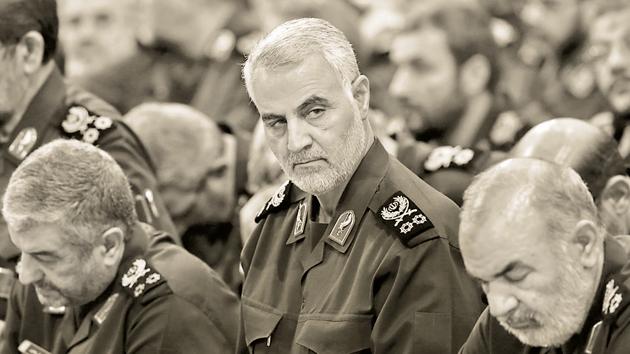US actions in West Asia have been destabilising. Russia, China will gain
The possibility of a full war has receded but there will be low-intensity conflict. India has a role to play
A sleepless night has given way to a sense of relief in West Asia. On Wednesday, Iran attacked military bases in Iraq, where the United States military personnel were stationed, in retaliation for the killing of its general Qassem Soleimani who was assassinated along with Al Mohandas, the Iraqi leader of the Popular Mobilisation Unit (PMU). But amid fears of a full-scale war, US President Donald Trump sent out a signal to de-escalate tensions. This was primarily after he was isolated by his own people and allies for this provocative act that could have resulted in a full-fledged war in the Persian Gulf.

There is a history to the conflict.
The balance of power in West Asia was destroyed with the US-United Kingdom invasion of Iraq in 2003. It was a grave mistake. Iraq plunged into crisis and the central authority in Baghdad collapsed. Sectarian riots broke out after the dissolution of the Iraqi army and the security apparatus. The US, in subsequent years, pushed for regime change in Syria, Yemen, Lebanon and Libya. Its need for oil, and the need to ensure the dominance of Israel in the region, drove its policy.
But all of this paved the way for Iran to expand its influence It was the Iranian support to the national resistance forces represented by the Hezbollah in Lebanon that halted the Israeli aggression in 2006. The attack on Hamas in the Gaza strip was also halted because of Tehran’s support to Hamas. The war in Syria led to the spread of terrorist organisations like Islamic State and Al-Qaeda. The US and its western allies, Turkey, and some Gulf countries such as Saudi Arabia and Qatar worked together to topple the Syrian government. It was the Iranian intervention in 2015 along with the support of Russia that gave the Syrian and Iraqi armies the upper hand in defeating these terrorist organisations in Syria and Iraq.
But the victory of US adversaries in the region caused apprehensions in Tel Aviv and some of the Gulf capitals. These states formed an informal anti-Iran alliance, and then persuaded the American administration to pull out from the Iranian nuclear deal, and even encouraged it to start a war against Iran.
This suited Trump, who had campaigned against the nuclear agreement with Iran during his election. He walked out of the deal, and followed it up with harsh economic sanctions and verbal attacks on the Iranian leadership.
However, Soleimani’s assassination was a step too far.
The main motive behind this escalation in US action is still to be ascertained. Some experts feel Trump was seeking to create a stir in order to push up his ratings, with an eye on the forthcoming US election. Others believe that he did so to distract from, and even perhaps delay, the impeachment process against him. It is also possible that he was misinformed about the ramifications of killing such a powerful Iranian leader.
But the impact was severe across the world. Oil prices surged, stock markets plunged and people were badly hit. The main importers of the oil from the Gulf region — India, China, Japan and South Korea — felt the immediate impact of rising tension in the region.
For Delhi, there was also an additional, pressing concern. There are around eight million Indian expatriates in West Asia, who send at least $40 billion in remittances annually. If a war had broken out, for India, both evacuating citizens and then finding jobs for them back home, at a time of an economic slowdown, would have been incredibly challenging.
Iran had no choice but to respond directly. There is now a de-escalation, and with it, the international community in general and the people of the region in particular would breath easily.
Russia and China will be winners after this crisis because of the loss of faith in the American administration and its policy towards the region. Baghdad, Tehran and Damascus will grow even closer to Beijing and Moscow.
The war in West Asia is not over yet. Provocations and low-intensity confrontations will occur in the coming months and the US will try to re-establish its dominance in the region by sending more troops to its military bases in Iran’s neighbours. It is possible that vested interests may attack American targets in order to bring place the blame on Iran, in the hope that the US will attack it.
The lesson learnt from defusing this crisis and previous wars in Iraq, Yemen and Libya should prompt New Delhi to take concrete steps in conflict prevention diplomacy. It should form alliances with the main stakeholders in the region to prevent a full scale war and also strengthen its military presence in the region .There has to be an early warning system to prevent adventurism in the Persian Gulf, Red Sea and the Mediterranean waters. These are turbulent regions going through troubled times, and all efforts must be made to keep the peace.
Waiel Awwad is an international independent journalist based in South Asia
The views expressed are personal



